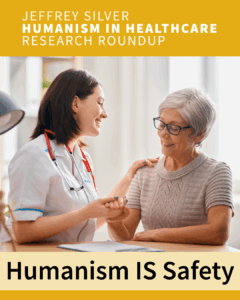 The Jeffrey Silver Humanism in Healthcare Research Roundup features summaries of recently published studies on humanism in healthcare. To receive email notification of new studies once per month, enter your information here and select “Jeffrey Silver Research Roundup” from the checkboxes at the bottom. See previous posts in this series.
The Jeffrey Silver Humanism in Healthcare Research Roundup features summaries of recently published studies on humanism in healthcare. To receive email notification of new studies once per month, enter your information here and select “Jeffrey Silver Research Roundup” from the checkboxes at the bottom. See previous posts in this series.
Publications from Gold Foundation-Affiliated Authors
Preparing interprofessional faculty to be humanistic mentors for medical students: The GW-Gold Mentor Development Program
Blatt B, Plack MM, Simmens SJ. J Contin Educ Health Prof. 2018 Spring;38(2):117-125.
Dr. Blatt is a recipient of a Gold Foundation mentoring grant.
Through GW-Gold workshops, faculty mentors develop interprofessional humanistic communities of practice, preparing them to lead second such communities with their students. This article describes the program and its evaluation. Mentors rated the program highly, gained confidence in their humanistic skills, and received high scores from students.
Physician burnout, well-being, and work unit safety grades in relationship to reported medical errors Free full text
Tawfik DS, Profit J, Morgenthaler TI, Satele DV, Sinsky CA, Dyrbye LN, Tutty MA, West CP, Shanafelt TD. Mayo Clin Proc. 2018 Jul 4. pii: S0025-6196(18)30372-0.
Drs. Dyrbye, West and Shanafelt are Mapping the Landscape, Journeying Together grantees.
Researchers conducted a population-based survey of over 6,500 U.S. physicians regarding burnout, fatigue, suicidal ideation, work unit safety grade, and recent medical errors. Over 50% reported symptoms of burnout, 32% reported excessive fatigue, and 6% reported recent suicidal ideation. Physician burnout, fatigue, and work unit safety grades were independently associated with major medical errors.
Organizational factors contributing to incivility at an academic medical center and systems-based solutions: A qualitative study
Pattani R, Ginsburg S, Mascarenhas Johnson A, Moore JE, Jassemi S, Straus SE. Acad Med. 2018 Jun 12.
Dr. Ginsburg is a member of the Mapping the Landscape, Journeying Together community
Researchers conducted 49 interviews with physicians at a university hospital. All participants had observed, heard of, or been personally affected by uncivil behavior occurring furtively, face-to-face, or online. The participants identified several organizational factors that bred incivility including physician non-employee status in hospitals, silos within the department of medicine, poor leadership, a culture of silence, and the existence of power cliques. They offered many systems-levels solutions to combat incivility through prevention, improved reporting, and clearer consequences.
Empathy present and future
Hall JA, Schwartz R. J Soc Psychol. 2018 Jun 18:1-19.
Dr. Hall is a Mapping the Landscape, Journeying Together grantee.
Researchers provide a quantitative review and conceptual analysis of empathy definitions and usages by examining 393 studies published between 2001 and 2013, and 96 studies published in 2017. They document the prevalence and diversity of definitions, as well as inconsistencies between conceptual definitions and measurements employed. They present ways to refine the conceptualization and operationalization of the empathy construct, including for many purposes, bypassing the term empathy in favor of lower-level construct labels that more precisely describe what is actually being measured.
Resident vitality in 34 programs at 14 academic health systems: Insights for educating physicians and surgeons for the future Free full text
Pololi LH, Evans AT, Civian JT, Shea S, Brennan RT. J Surg Educ. 2018 Jun 18. pii: S1931-7204(18)30066-7.
Dr. Pololi is a Gold Foundation Research Institute grantee.
Researchers surveyed 1,708 residents at 34 programs across the U.S. using the C – Change Resident Survey. The survey assessed residents’ vitality and 12 other dimensions that characterize residents’ perspectives of the culture of the residency training programs. There was wide variation among the 34 programs in the percent of residents who had high Vitality scores, ranging from 17% to 71%. The strongest predictors of Vitality were Work-life integration, Relationships/inclusion/trust, Institutional/program support, Respect, Values alignment, and Ethical/moral distress.
Grappling with complexity: Medical students’ reflective writings about challenging patient encounters as a window into professional identity formation
Wald HS, White J, Reis SP, Esquibel AY, Anthony D. Med Teach. 2018 Jun 26:1-9.
Dr. Wald is a Gold Humanism Scholar.
The authors developed an interactive reflective writing curriculum within a Family Medicine Clerkship and analyzed students’ reflections about challenging/difficult patient encounters. They identified 26 unique themes within five categories (role of emotions, role of cognition, behaviorally responding to situational context, patient factors and external factors). They also found and describe a professional identify formation model that involves students’ backgrounds, emotions and previous experiences in medicine merging with external factors and processed during student-patient interactions.
OpenNotes and shared decision making: A growing practice in clinical transparency and how it can support patient-centered care
Fossa AJ, Bell SK, DesRoches C. J Am Med Inform Assoc. 2018 Jun 29.
Dr. Bell is a Gold Professor.
Authors used survey data to investigate whether patients who read more visit notes (using the OpenNotes system) would report greater shared decision making than those who read fewer notes. Using data from over 6,900 patients they found that those who read 4+ notes in the past 12 months were 17% more likely to have a higher shared decision making score when compared to patients who had not read any notes in the past year.
Other Publications
Exploring differences in patient-centered practices among healthcare professionals in acute care settings
Sidani S, Reeves S, Hurlock-Chorostecki C, van Soeren M, Fox M, Collins L. Health Commun. 2018 Jun;33(6):716-723.
Over 380 professionals (physicians, nurses, social workers, other healthcare providers) across 18 hospitals in Canada completed a self-report instrument assessing the three components of patient-centered care (holistic, collaborative, and responsive care). Small differences were found in practices across professional groups: (1) physicians reported higher levels of enacting the holistic care component; (2) physicians, other healthcare providers, and social workers reported implementing higher levels of the collaborative care component; and (3) physicians, nurses, and other healthcare providers reported higher levels of providing responsive care.
Happier healers: Randomized controlled trial of mobile mindfulness for stress management
Yang E, Schamber E, Meyer RML, Gold JI. J Altern Complement Med. 2018 May;24(5):505-513.
Eighty-eight medical students were randomized to either intervention or control groups to use the mobile application Headspace, an audio-guided mindfulness meditation program, for 30 days. All participants completed several measures of stress and well-being at baseline (T1), 30 days (T2), and 60 days (T3). Researchers found that perceived stress significantly decreased for the intervention group from T1 to T3 and general well-being significantly increased for the intervention group compared to the control group from T1 to T2, and the increase was sustained through T3.
Medical communication: The views of simulated patients
Laughey W, Sangvik Grandal N, M Finn G. Med Educ. 2018 Jun;52(6):664-676.
Researchers interviewed 18 simulated patients from two medical schools and conducted a qualitative analysis of these conversations. Three global themes were identified: listening/empathy and showing it, continual human connection and information flow from the patient. These three themes, termed the communication triad, form a type of virtuous circle, each facilitating the other. The article presents five novel teaching points that emerged from this analysis.
Determinants of compassion satisfaction, compassion fatigue and burn out in nursing: A correlative meta-analysis Free full text
Zhang YY, Zhang C, Han XR, Li W, Wang YL. Medicine (Baltimore). 2018 Jun;97(26):e11086
Researchers conducted a meta-analysis of 11 studies about factors affecting compassion satisfaction, compassion fatigue and burnout in nursing. They found that a variety of stressful factors, as well as negative affect, promote compassion fatigue and burnout. Positive affect is helpful in achieving compassion satisfaction. Demographic or professional factors were not significantly related to compassion satisfaction, compassion fatigue, or burnout.



